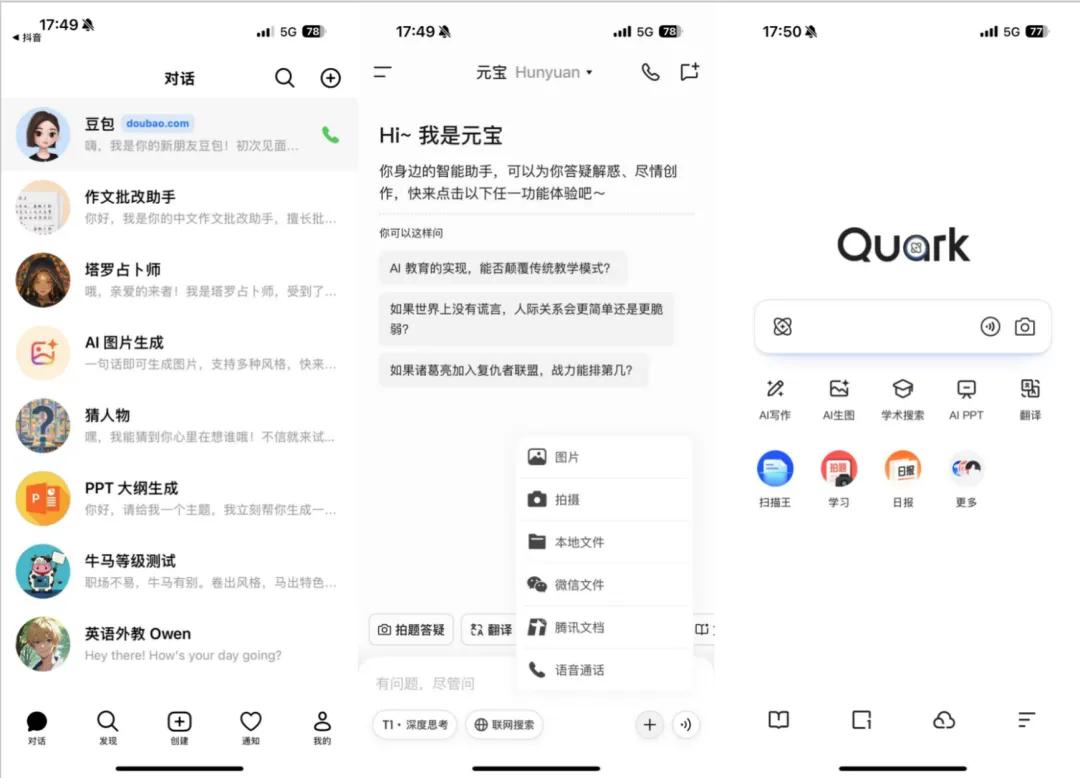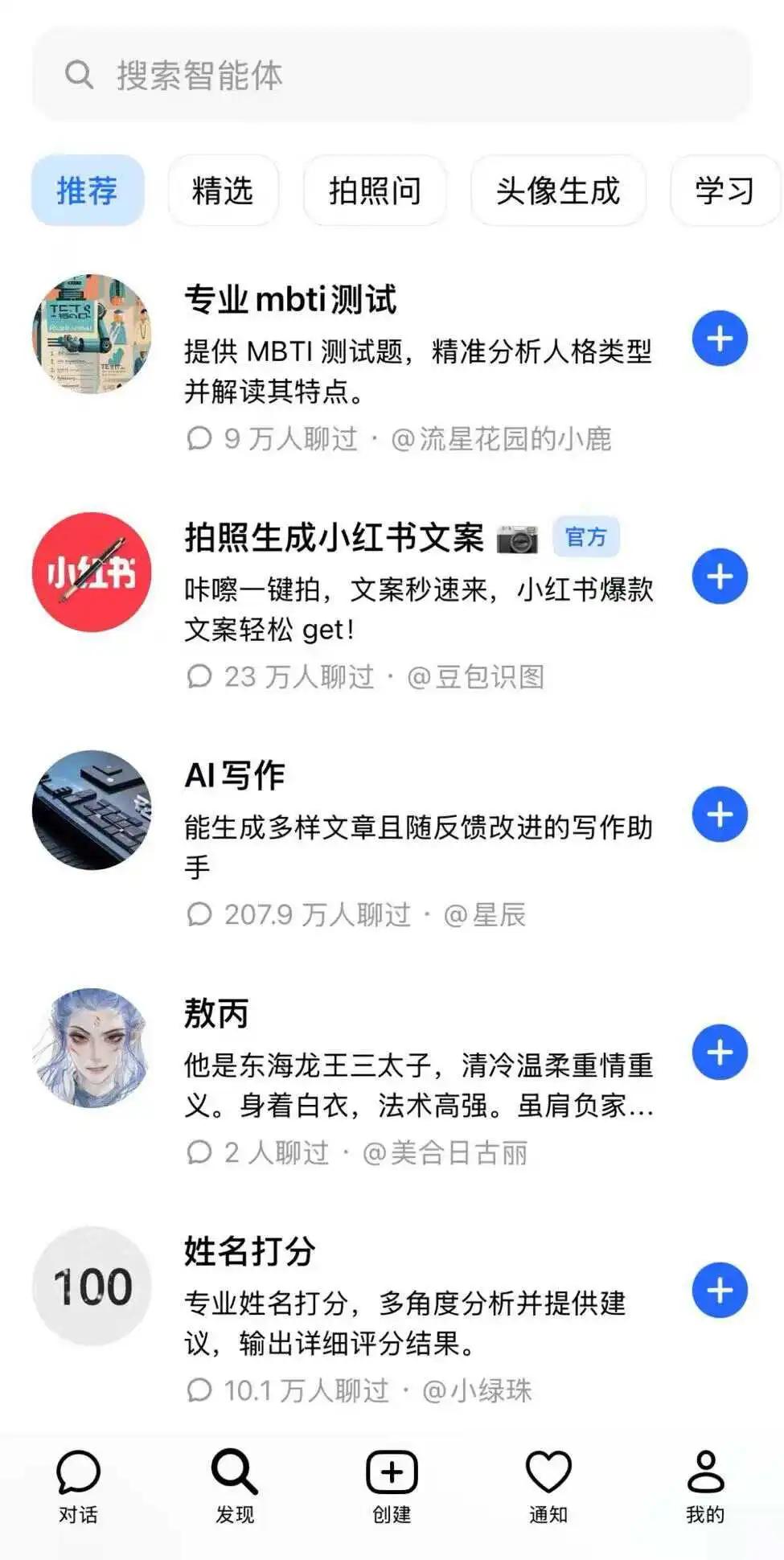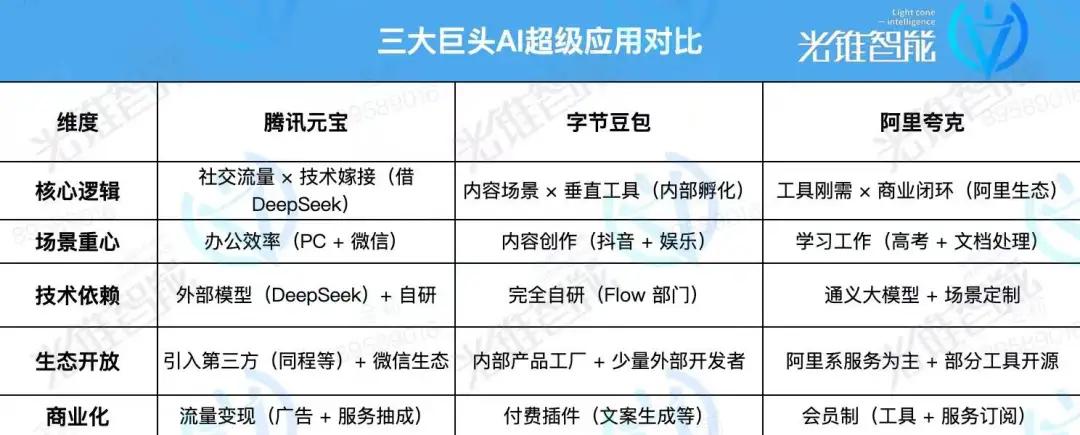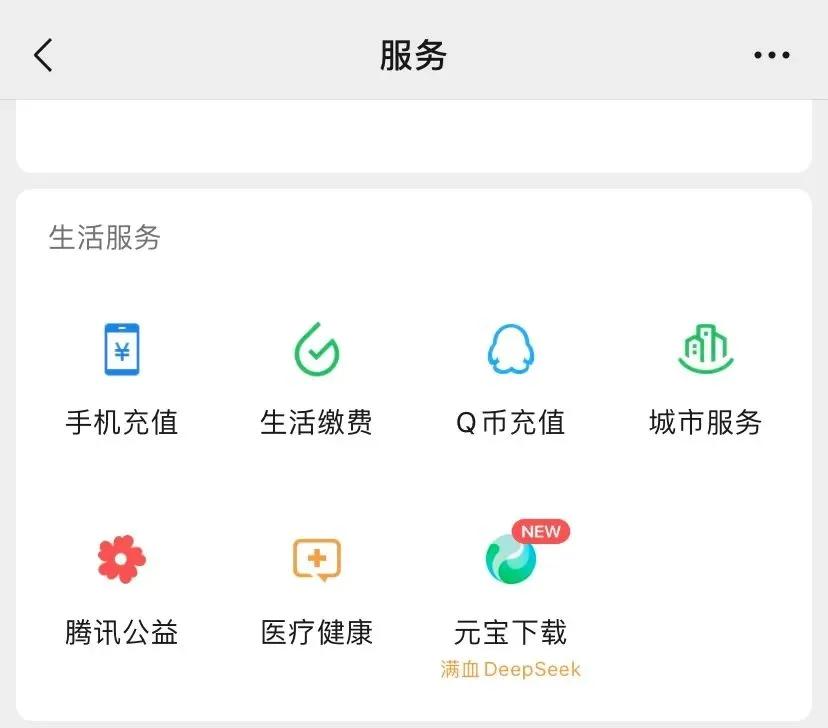AI Super Apps: ByteDance Doubao, Tencent Yuanbao, and Alibaba Kuake Stand as Pillars
![]() 03/19 2025
03/19 2025
![]() 733
733

Do AI chat products genuinely possess value?
While ChatGPT has sparked the trend of large models, China's tech giants have distinct answers to this question.
In 2024, while Baidu's investment in ERNIE Bot App waned, Alibaba's Tongyi and Tencent's Yuanbao faced internal challenges, with only ByteDance showing steadfast support for Doubao.
By 2025, however, the giants had converged on a unified response.
With Kuake positioned as Alibaba Group's core AI To C platform, the AI super apps landscape, led by ByteDance Doubao, Tencent Yuanbao, and Alibaba Kuake, has officially taken shape, forming a tripartite rivalry.

Home Interface: Left Doubao, Middle Yuanbao, Right Kuake
In product design, each company adopts different approaches.
ByteDance's Doubao homepage is still dominated by agents, with the search box below occupying a prominent position. Tencent's Yuanbao, akin to ChatGPT, is a pure AI chatbot, albeit with some content integration with WeChat. Kuake, on the other hand, prioritizes search and specific user scenarios through a combination of search and tools, which is pivotal for creating commercial value.
Behind these differing designs lie the unique perspectives of the three giants on AI super apps. Doubao aims to be more of an app store for agents, with search playing a secondary role. Tencent's Yuanbao positions itself as an AI assistant, whereas Kuake emphasizes search and vertical scenarios, fully leveraging its tool attributes.
Despite the current instability of each company's super apps and their inability to fully encapsulate the AI strategy of the entire company, the giants have decided to support their "AI offspring" based on the principle that "nothing is impossible without it."
This change in attitude is not impulsive but a genuine recognition of the value of AI super apps.
On a smaller scale, user habits are indeed evolving, with more users abandoning traditional search engines in favor of AI for answers. The launch of PC versions of Doubao and Kuake will have more direct monetization potential in office and learning scenarios. On the mobile app front, while traffic value has yet to be fully converted into commercial value, the trend is strong enough for the giants to make a decisive move.
On a larger scale, AI super apps are seen as the "meta-entrance" to replace traditional apps, representing a strategic battle among internet giants for the entrance to the next-generation digital ecosystems, dominance over user minds, and the right to define industry rules.
In this battle, Alibaba's Kuake anchors itself with a closed-loop tool, ByteDance's Doubao wields content ecology as its sword, and Tencent's Yuanbao shields itself with a social entrance, as the three giants engage in a fierce game for the right to speak in the AI era.
Kuake secures Alibaba's central position, forming a tripartite confrontation
Kuake's resurgence within Alibaba epitomizes Alibaba's "slow and steady wins the race" approach in the AI era and a pragmatic choice amid fierce competition from Yuanbao and Doubao.
When newcomers like Tongyi App failed to breakthrough, Kuake, with its decade of user accumulation and the advantages of AI toolification, became Alibaba's "lifesaver" for AI To C.
Unlike Doubao and Yuanbao, which are native AI applications within their respective groups, Kuake transitioned from a traditional search business to become an entrance for AI super apps, initially a relatively marginal business within the Alibaba Group.
Amid the large model wave in 2024, Alibaba faced a crisis of lacking a C-end entrance, with Tongyi App failing to gain traction and lagging behind Doubao and Yuanbao in overall performance. Consequently, Kuake was gradually elevated to a core position within the Alibaba Group.
Now, Alibaba regards Kuake as its flagship product for AI to C, a "must-choose" option to compete against ByteDance and Tencent. With Kuake's elevated status, the competitive landscape of the AI super apps market, with Tencent, ByteDance, and Alibaba forming a tripartite confrontation, has solidified.
In terms of product design, due to the different genes of Tencent, ByteDance, and Alibaba, in addition to the iterative updates of underlying large model technologies, their approaches to creating AI super apps also vary.
ByteDance's Doubao's basic interface encompasses functions such as basic AI search, AI image generation, AI creation, photo-taking question answering, and deep thinking, allowing users to consult Doubao on related issues through dialogue or video calls.
Upon exiting Doubao's basic interface and returning to the overall interface, Doubao is integrated into all agents as an AI chat assistant. ByteDance's core approach to AI super apps is to enable users and external developers to build agents based on the Kouzi platform, forming a diversified AI chatbot ecosystem.

Internal Agent Interface of Doubao
According to relevant data, as of March 2025, the Kouzi platform has cumulatively created over 500,000 AI Bots, covering vertical categories such as anime and education, with 23% of these Bots integrated into Douyin Mini Programs, forming a closed loop of "creation - distribution - monetization."
However, among its numerous agents, many tend to be entertainment-oriented, with few actually applicable to commercial scenarios. Additionally, the agents currently built on the Kouzi platform are mostly internal products, with the external developer ecosystem yet to explode.
Tencent's Yuanbao is a relatively pure AI chat assistant, more akin to ChatGPT 1.0, except that, compared to other AI chat assistants, Tencent's Yuanbao is deeply integrated with Tencent's other product ecosystems.
In the interface of Tencent's Yuanbao, in addition to basic AI Q&A and deep thinking capabilities, it also integrates WeChat files and Tencent Docs, enabling one-click jumps to WeChat and uploads of WeChat files.
In comparison, the functions integrated into Kuake APP are more "practical," with its core approach being search + tools. Kuake originally started as a search engine and, by integrating AI tools on top of search, it enables users to experience greater efficiency.
Kuake's previous recognition by the public stems from its launch of AI services for the college entrance examination during the 2020 exam period, providing functions such as university inquiries and mock volunteer filling, attracting over 10 million users. Nowadays, in addition to academic search, Kuake also integrates practical tools such as ScanMaster and Kuake Cloud Disk.
Over the past decade, the C-end traffic landscape has been firmly dominated by WeChat, Douyin, and others, with Alibaba repeatedly attempting to break through into content and social media but encountering setbacks. The advent of the AI era has profoundly changed the way traffic is distributed, and Alibaba hopes to re-establish its C-end presence through Kuake.
However, whether Kuake can fulfill Alibaba Group's ambitions for a C-end AI super entrance in the future depends on whether it can avoid becoming a "diversion frame for Alibaba services" in ecological synergy and truly become an AI assistant that users actively rely on.
Moreover, although Deepseek has emerged as a "new aristocrat" in the AI super apps market through technological innovation, it does not yet possess the ability to compete with the giants in winning over user minds across technology, traffic, and ecology in this all-round war.
As Fu Sheng said, large companies have more advantages in the AI To C market.
With ByteDance's Doubao relying on Douyin scenarios, Tencent's Yuanbao embedded in the WeChat ecosystem, and Kuake forming a closed loop of "search - tools - services" through functions such as ScanMaster, learning tools, and cloud disks, the AI super apps ecological war among the three giants has officially begun.
From Traffic Competition to Ecological Dominance: The Giants' Ambitions for AI To C
Competition among giants is often more direct and brutal, especially when substantial funds are invested in the traffic market.
In the rivalry between the three giants, except for Kuake, which did not receive significant traffic investment support from within Alibaba, ByteDance's Doubao and Tencent's Yuanbao received large-scale traffic investment support in the early stages, yielding immediate results.
For instance, for a long time, Tencent's Yuanbao was just a "small player," but on February 22, Tencent's Yuanbao surpassed Doubao, rising to second place on China's Apple Free App Download Rankings.
Behind this, according to AppGrowing platform data, as of February 27, Tencent's Yuanbao had cumulatively invested 281 million yuan over 27 days, with most of the investment concentrated after February 13.
Relevant data shows that ByteDance spent over 1 billion yuan on traffic investment for Doubao throughout 2024, while since March last year, the total investment amount for Kimi by Dark Side of the Moon has also reached 900 million yuan. However, Alibaba did not provide large-scale traffic investment support for Kuake.
In fact, traffic investment has always been a consistent approach for AI native apps to compete for traffic. In 2024, ByteDance's Doubao also exchanged market share through substantial investments. Leveraging its vast traffic engines such as Douyin, Toutiao, and Xigua Video, ByteDance fueled rapid growth in Doubao's user base.
Sources close to ByteDance told Guangzhui Intelligence that ByteDance has restrictions on the traffic investment of AI competitors in short video channels, preferring to forgo this advertising revenue in order to promote apps like Doubao and Jimeng AI.
According to third-party statistics, at the beginning of 2024, Doubao's MAU was less than 2 million, but by November, its MAU had soared to 59.98 million, ranking second globally and first domestically, behind only ChatGPT.
While traffic investment has led to a short-term surge in traffic, it is not a sustainable solution. For AI super apps, retaining users in the long run is more crucial, which is inseparable from the giants' strategic approach of integrating AI with their own ecosystems.

However, due to the differentiation in the genes of Tencent's social ecology, ByteDance's content ecology, and Alibaba's business ecology, there are also differences in the ecological strategies of Tencent's Yuanbao, ByteDance's Doubao, and Alibaba's Kuake.
ByteDance's vast content ecology has made Doubao an "ultimate player" in content scenarios, reaping the benefits of content data.
The rise of Doubao is a continuation of ByteDance's "traffic + scenario" strategy, rapidly validating demand through the Douyin content ecology, seizing the enterprise market with low-cost models, and attempting to break boundaries with hardware and developer platforms.
On one hand, Doubao is gradually being deeply integrated with Douyin. Sources indicate that the Douyin APP is testing the integration of AI capabilities from the Doubao App. In the test version, Douyin has opened two super entrances for the Doubao App:
One is placed on the short video interface, alongside functions such as liking, commenting, and sharing, occupying a significant traffic position. The other is placed in the Douyin message list, deeply integrating AI technology with social functions, further enhancing the user interaction experience.
It can be said that Douyin provides a super traffic entrance for Doubao, enabling it to quickly reach a massive number of users.
Behind Yuanbao lies Tencent's entire social content ecology.
Within WeChat, the WeChat search bar has added a jump entrance for "Download Yuanbao (Experience DeepSeek-R1)," covering 800 million monthly active users. The "Life Services" section of WeChat's nine-grid interface has added a "Download Yuanbao" entrance, alongside high-frequency functions such as "WeChat Pay" and "Meituan." Large-scale advertising for Yuanbao has been placed on WeChat Official Accounts, Moments, Mini Programs, etc., with even forced jump links embedded at the bottom of Official Account articles.

In Tencent's product matrix, over 20 Tencent apps, including QQ Browser, Tencent Video, Tencent News, QQ Music, and Sogou Input Method, have simultaneously launched splash screen advertisements, forming a three-dimensional promotion of "internal traffic pool + external traffic investment."
Additionally, compared to Doubao's insistence on using self-developed large models, Yuanbao quickly integrated the full-blooded version of DeepSeek. After integrating DeepSeek, Yuanbao almost "updated every two days," intensively launching functions such as image understanding, WeChat file analysis, and long image sharing, and testing the "fast thinking" version Turbo S of the Hunyuan T1 model, doubling the speech speed.
This dual-track strategy of "self-development + external models" attempts to quickly attract users through DeepSeek while also allowing time for iteration of the Hunyuan model, essentially balancing short-term growth with long-term technological autonomy.
Undoubtedly, Yuanbao has become an important lever for Tencent in the AI race, leveraging the traffic leverage of the WeChat ecology, massive capital investment, and technological resource integration to quickly capture user minds with the "DeepSeek + Hunyuan" dual-core model.
Relying on the Alibaba ecology, Kuake can connect scenarios such as e-commerce, healthcare, and education, for instance, cooperating with AliHealth to provide online consultation and integrating content resources with Shuqi Novels. This ecological synergy can increase user frequency and form a closed loop of "tools + content + services."
Nevertheless, a pertinent question emerges: In comparison to ByteDance's Douyin and Tencent's WeChat Pay, how can Kuake enhance its relevance to users' daily lives, evolving from a mere "traffic gateway" into an "AI hub for everyday life"?
Despite their notable achievements, these tech giants grapple with various anxieties, primarily rooted in the pressing need for technological advancement, intense competition for market share, the unpredictability of business models, and the strategic pressures within the broader ecological landscape.
For instance, when considering foundational models, integrating third-party solutions may temporarily enhance user experience but may lead to long-term dependency and constraints. Alternatively, pursuing in-house development entails substantial R&D investments—both financial and human—while the sustainability of a leading position remains uncertain.
This strategic dilemma highlights the giants' passivity and anxiety in ecological competitions, fearing that a misstep could undermine their competitive edge.
More crucially, once Douyin, WeChat Pay, and Kuake attain significant traffic, they must compete fiercely for user retention in every conceivable scenario.
Take the social data + service integration capabilities of the WeChat ecosystem as an example—when a user requests "help me book a Friday high-speed rail ticket" within WeChat, the AI seamlessly invokes the 12306 Mini Program and syncs the itinerary to the user's calendar. This "scenario-agnostic integration" epitomizes the ultimate super-entrance experience.
Ultimately, the battle for AI discourse power will revolve around the self-sustaining cycle of "technology - data - scenario." The entity that can generate unique user data within its ecosystem—be it interaction data from WeChat, content creation from Douyin, or consumption decisions from Kuake—and feed these insights back into model evolution may well emerge as the "operating system" of the AI era.








